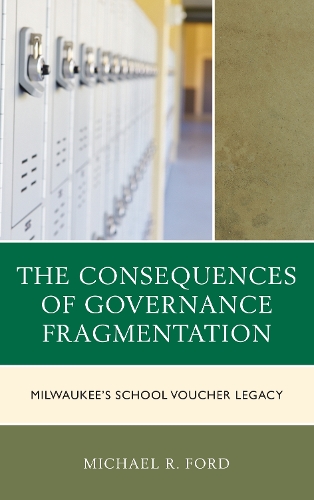
The Consequences of Governance Fragmentation: Milwaukee's School Voucher Legacy
(Hardback)
Publishing Details
The Consequences of Governance Fragmentation: Milwaukee's School Voucher Legacy
By (Author) Michael R. Ford
Bloomsbury Publishing PLC
Lexington Books
6th September 2017
United States
Classifications
Professional and Scholarly
Non Fiction
Education / Educational sciences / Pedagogy
Decision theory: general
Educational strategies and policy
Regional, state and other local government
379.11109775
Physical Properties
Hardback
198
Width 157mm, Height 239mm, Spine 22mm
485g
Description
The Consequences of Governance Fragmentation explains the ongoing legacy of Milwaukees longstanding school voucher policy. The book details the evolution of school choice in Milwaukee, its impacts on student achievement, key externalities such as school closures and political conflict, and the ways in which the Milwaukee voucher program challenges traditional notions of accountability and democratic control. Michael R. Ford concludes that the voucher policy has fragmented public education to the point where true aggregate level progress of pupils is impossible and proposes an umbrella governance structure to bring funding and accountability equity to all publicly funded Milwaukee schools.
Reviews
At a time when national interest in school vouchers and school choice is very high, there are valuable lessons to learn from Milwaukee, which has the oldest and most impactful voucher program in the United States. Mike Ford is an excellent person to teach those lessons. In this book, he provides a clear-eyed, knowledgeable, realistic, and insightful examination of the record and results of the voucher program, along with provocative thoughts on what public policy lessons it teaches. -- Alan Borsuk, Marquette University Law School
At a time when the national debate over school choice is more vicious and polarizing than ever, Michael Ford brings some well needed balance, nuance, and perspective to the issue. Grounded in the real experience of Milwaukee families, rather than ideology or theory, he makes a compelling case for a more cohesive approach to improving urban schools. -- Michael J. Petrilli, President, Thomas B. Fordham Institute
Author Bio
Michael R. Ford is assistant professor of Public Administration at the University of WisconsinOshkosh.
